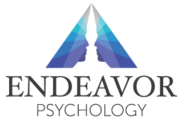What is Neuropsychological Testing?
Neuropsychological testing is used to diagnose attention-deficit/hyperactivity disorder (ADHD), autism, dyslexia, and other related conditions. Results from neuropsychological testing are often used to help guide treatment planning, which may include therapy, medication, school-based services, and lifestyle changes. Additional information regarding neuropsychological testing can be found in our Frequently Asked Questions (FAQs) section below.

Neuropsychological Testing at Endeavor
Dr. Matthew Goodnow specializes in neuropsychological testing for children, adolescents, and young adults. Dr. Goodnow frequently conducts evaluations for ADHD, autism, and dyslexia, and also has extensive experience working with individuals with anxiety, depression, post-traumatic stress disorder (PTSD), obsessive-compulsive disorder (OCD), dysgraphia, dyscalculia, and other issues. Dr. Goodnow utilizes a strength-based approach in his evaluations and often assists students (from elementary through graduate school) seeking services and/or accommodations at school. Dr. Goodnow conducts evaluations at both our Boston and Marblehead offices.
ADHD Testing
ADHD testing for children and adults (ages 6 and up) is available through the Endeavor Psychology practice. The ADHD protocol utilizes a combination of clinical interviewing, cognitive testing, behavioral measures, and other evidence-based methods. The assessment includes:
- In-depth clinical interview with one of our highly qualified clinicians
- Comprehensive cognitive assessment utilizing the latest on-line testing protocols
- Scoring and interpretation of results by our cognitive assessment team
- 1 on 1 consultation to review and discuss your results including recommendations for further treatment (e.g. further testing, individual therapy, ADHD coaching, medication referral).
Based on assessment results, patients typically receive a variety of recommendations. Academic-related recommendations are provided when appropriate and might include adding school-based services and supports (e.g., extended time on tests, the option of taking tests in a separate room). In addition, patients are often provided with day-to-day strategies (e.g., coping strategies addressing attentional difficulties, memory and organization challenges, mood-related issues, behavioral problems).
Neuropsychological Assessment FAQ's
Q: What does a neuropsychological evaluation involve?
A neuropsychological evaluation typically involves 3 or 4 appointments. During the first appointment, the intake session, the patient meets with the evaluator to discuss their current symptoms, the timeline of their symptoms, medical history, educational history, etc. For evaluations involving children and adolescents, the evaluator meets with the child/adolescent’s parents for the intake session. At the next appointment, the testing session, the patient meets with the evaluator in-person to complete a series of paper-and-pencil tests, computer-based tests, questionnaires, and additional clinical interviewing. This session can be completed in 1 or 2 sittings (sessions completed in one sitting typically last 5-6 hours, whereas sessions completed over two sittings consist of two 2-3 hour sessions). At the final appointment, the feedback session, the patient meets with the evaluator again to review the results from the evaluation, including the test scores, diagnosis, and recommendations. Depending on the patient’s age, the patient may or may not participate in the feedback session. For example, for evaluations involving young children, the evaluator usually meets with the child’s parents (the evaluator can, however, meet with the child for a separate feedback session upon request).
Q: Is the evaluation completed in-person? Or can it be completed virtually?
The evaluation typically involves a combination of both in-person and virtual appointments. The intake session is usually completed virtually. The testing session, however, is completed in-person at either our Boston office or our Marblehead office. The feedback session is usually completed virtually.
Q: How long does it take to complete the evaluation?
The intake session typically lasts about 1 hour. The testing session- when completed in one sitting- usually lasts 5-6 hours (when testing is completed in two sittings, each session usually lasts 2-3 hours). The feedback session typically lasts 1 hour. Regarding the timeline of the appointments, the testing session is usually completed 1-2 weeks after the intake session, and the feedback session is usually completed 2-3 weeks after the testing session.
Q: What should I do after the evaluation is completed?
After the feedback session, the evaluator will send the patient a copy of the evaluation report- a written document which summarizes background information, test scores, diagnosis, and recommendations. If a patient is seeing a therapist or prescriber, we recommend that the patient submit a copy of the report to this individual (or both individuals). In addition, patients often choose to submit the evaluation report to their school. For instance, college students will often submit the report to their school’s disability resource center, while parents of young children will often submit the report to the special education department at their child’s school.
Q: Do you help students who are looking to apply for services and/or accommodations at school?
Yes! Dr. Goodnow frequently works with college and graduate students who are looking to apply for accommodations such as extended time on exams, the option to take exams in a separate room, priority registration, etc. Dr. Goodnow also works with parents who are seeking services and accommodations for their child at school through an IEP or 504 plan. Results from a child’s evaluation may lead to services at school, such as regular sessions with a reading specialist or a social-emotional counselor. Results may also lead to helpful accommodations, such as extended time on tests, preferential seating, additional movement breaks, etc.
Q: How is neuropsychological testing different from testing completed through a child’s school?
Neuropsychological testing is often used to diagnose conditions such as ADHD, autism, dyslexia, etc. Testing completed through a child’s school, however, usually does not result in a diagnosis. Neuropsychological evaluations also offer recommendations that are tailored to the individual student (rather than generic recommendations typically offered by schools). Lastly, neuropsychological evaluations assess areas not typically covered in school-based evaluations, such as attention, executive functioning, and memory.
Q: What is the difference between neuropsychological testing and therapy?
Neuropsychological testing is completed over a brief period of time (usually over a few weeks), whereas therapy is provided on an on-going basis (often over the course of months, or even years). Neuropsychological testing also utilizes objective measures, such as paper-and-pencil tests and computer-based tests, not typically used in therapy. In addition, certain conditions can only be diagnosed reliably through neuropsychological testing (and cannot be diagnosed reliably through therapy), such as dyslexia and autism.
ADHD Coaching
Individuals with attention-deficit/hyperactivity disorder (ADHD) often struggle with focus, organization, and time-management. For instance, someone with ADHD may lose things often (e.g., their phone, keys, or wallet) or experience significant problems with procrastination (e.g., always starting assignments at the last minute, which causes the quality of their work to suffer).
While many individuals with ADHD benefit from traditional talk therapy, others benefit more from “ADHD coaching.” ADHD coaching is similar to therapy, except the primary goal of these sessions is to discuss and review strategies to help improve focus, organization, and time-management. These strategies may include the use of timers/alarms, planning ahead for assignments, and exercise. An ADHD coach can also help explain how certain day-to-day challenges are related to the individual’s diagnosis and certain underlying neurobiological processes.
ADHD coaching can be particularly useful for individuals who take medication for ADHD, but still need help with organization and time-management. It can also be helpful for individuals who may not require therapy (e.g., those who are only experiencing mild or no issues with anxiety, mood, etc.), but would still benefit from various strategies to help manage ADHD.
Dr. Matthew Goodnow provides ADHD coaching for adolescents and young adults. His coaching sessions are ideally suited for high school students, college students, graduate students, and young professionals.
